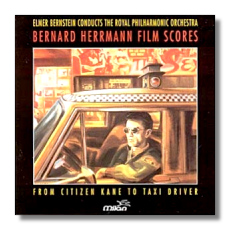
The Internet's Premier Classical Music Source
Related Links
- Herrmann Reviews
- Latest Reviews
- More Reviews
-
By Composer
-
Collections
DVD & Blu-ray
Books
Concert Reviews
Articles/Interviews
Software
Audio
Search Amazon
Recommended Links
Site News
 CD Review
CD Review
Bernard Herrmann

Film Music
- Citizen Kane Suite
- The Devil and Daniel Webster (All that Money Can Buy):
The Devil's Concerto - Psycho Suite
- The Wrong Man: Prélude
- Vertigo: Scene d'Amour
- North by Northwest: Prélude
- The Bride Wore Black Suite (arr. Palmer)
- Fahrenheit 451: Finale
- Taxi Driver Suite (arr. Palmer)
- Arthur Benjamin: Cantata "The Storm Clouds" (arr. Herrmann)
- Interview with Bernard Herrmann (recorded early 1970s)
Royal Philharmonic Orchestra/Elmer Bernstein
Milan 73138 35643-2 69:16
Great films don't necessarily mean great scores. I can't think of one John Ford film whose music I'd want to listen to all by itself. Conversely, a great score is often better than the film, a situation Miklós Rózsa and Erich Korngold frequently found themselves in. Copland never scored a really great movie, although he worked on some very good ones. Rarer than these, however, is the score which helps make the great movie – where the composer has a dramatic sense at least the equal of a fine director. The film music of Bernard Herrmann falls into this category more than that of any other composer.
Herrmann had a super-Romantic sensibility – mostly Gothic and gaslight. In Citizen Kane and Psycho, his music seemed to deepen the shadows thrown on and cast from the images. From The Ghost and Mrs. Muir, Hangover Square, and Jane Eyre to Sisters, Obsession, and Taxi Driver, the music broods, working up to sudden explosions of rage or of great passion. Herrmann should have made his mark in opera, despite the flaws in the one he actually composed (Wuthering Heights). He had the sincerity of a Verdi, willing to take drama to the height – even over the top – to make an effect. I'm convinced the Psycho shower scene – in fact, most of the film – would be laughable (or at least less mythic) without the music. It's the music that makes me tingle and jump.
Herrmann had the good fortune to break into films at the very top with his score for Orson Welles's Citizen Kane. He also did The Magnificent Ambersons. He contributed to films by Truffaut, Scorsese, and DePalma, and his longest collaboration was with Hitchcock. For Herrmann, all of these directors carved out opportunities for extended sequences usually denied to film composers, where music actually took the spotlight. Citizen Kane had the famous breakfast montage and the opera scene. Obsession had the kidnap montage and the cathedral sequence. For Hangover Square, Herrmann got to write a 12-minute piano concerto (which ends with solo piano). Hitchcock's films generally demanded extended musical treatment to supply a feel for character usually missing in the script and in the direction. The "Scene d'Amour" in Vertigo is almost all music. As Hitchcock told Herrmann, "We'll just have the camera and you."
Hitchcock in particular was almost always very canny about music. In his first version of The Man Who Knew Too Much (with John Gielgud and Peter Lorre), he had developed a sequence in the Royal Albert Hall involving an assassination during a performance. He sets it up early on when the assassin receives his instructions to shoot on the musical cue of a cymbal crash. Arthur Benjamin (a composer undeservedly forgotten even in the present revival of 20th-century British music; anyone know his Piano Concertino ?) rose to the occasion with a 9-minute cantata, complete with cymbal climax, whose words subliminally comment on the drama's suspense. When Hitchcock remade the film (this time with Herrmann), Herrmann decided to keep the Benjamin cantata. It's just about the only time I've ever seen an audience en masse on the edge of their seats as they listened to classical music.
Most of the selections have been available at one time or another, usually on albums conducted by the composer himself. If you haven't these, Elmer Bernstein does a fine job. I, however, prefer "complete" scores to excerpts or suites, even Herrmann's own (Welles Raises Kane, and the Psycho: Narrative for Orchestra). We really need a complete Citizen Kane and Psycho.
There are, however, a few discoveries. Like most Romantics, Herrmann had a fantastic as well as a phantasmagoric side. He scored most of the Ray Harryhausen stop-action features: Journey to the Center of the Earth, Jason and the Argonauts, Mysterious Island, The Seventh Voyage of Sinbad, and (my favorite) The Three Worlds of Gulliver. All That Money Can Buy (later renamed The Devil and Daniel Webster, the Benet story on which the movie was based) tells about a New Hampshire farmer who sells his soul to the devil in order to marry his true love. The devil, in the form of a Boston lawyer, shows up at the wedding party and plays the violin. Herrmann brilliantly illustrates this moment with a bizarre – and diabolically brilliant – set of variations on "Pop Goes the Weasel." Herrmann, for some reason, omitted the sequence from Welles Raises Kane, and it appears in recording for the first time here.
The second novelty is Christopher Palmer's suite from Taxi Driver. I know, I prefer whole scores, but this suite actually betters the (disappointing) original soundtrack album. No one surpassed Palmer in the ability to shape disjointed movie cues into concert scores. The "Night Piece" brings this music into sharper focus. As far as I know, no music from The Wrong Man or from The Bride Wore Black has been recorded before. Excerpts from both films appear here.
Finally, there's an interview with Herrmann himself, at once cutting to the heart of the matter and occasionally letting annoyance at having to explain the obvious slip through. Well, that's what a genius sounds like.
Copyright © 1997, Steve Schwartz



















